The top 1% smart thinkers I've observed have all been very clear thinkers. They could elucidate complex thoughts as they understanding the basics, at a very fundamental level. Sure, you could memorize all kinds of complicated concepts and stitch them together, but you will only get so far. And I feel that cleaner thinking is an outcome of deeper reflection — both reflection in action, and reflection on action (more on that later)
Richard Feynman very famously does this in "Six Easy Pieces", one of his physics lectures. He basically explains mathematics in three pages. He starts from the number line, the rudimentary, one + one = two, and then goes all the way up to precalculus stage. He just builds it up through an unbroken chain of logic, and not really relying on definitions to advance his ideas.

Everyone can benefit from cleaner thinking, and I was wondering if we do have tools that enable such deeper reflection. Is reflection the best way to absorb ideas better?
“We do not learn from experience... we learn from reflecting on experience.” ― John Dewey
In Mortimer J. Adler and Charles van Doren's very meta book on 'How to Read a Book', he talks about the different types of learning. If I try to summarise the gist of what this book is about: you first summarise and reflect on what you understood from each chapter as you move forward: try to paraphrase the chapter into a paragraph, or even a line if possible. You reflect in action, and you reflect on the action. And this makes you absorb the key ideas faster, and also help you use them in your relevant contexts.
He ends with another process which is considered to be the most difficult form of learning called as 'syntopic learning'.
In nutshell, you are building a systematic understanding of the entire literature by reading multiple books on the single subject and by doing a deeper reflection. You synthesize different viewpoints and create original conclusions which might even deviate from the viewpoints of the authors you've read from.
Giving a more recent example of syntopic learning, I was having a conversation with my ex-colleague from Noora Health recently, discussing how my grasp of product management has thickened rapidly owing to various switches across companies and industries (healthcare, education, SaaS and now academic publishing).
The processes, the scale of the organisation, the type of problems one encounters have all been very different. And yet, this has led to a great sense of learning, as you start seeing patterns around you from even the most estranged themes. I was able to see these patterns as I was deeply reflecting on my past actions. In some way, I was breaking down various concepts into its true essence, chewing and digesting them.
If I look back at the aha! moment I had had when I was able to draw do a comparative study of product management across two different companies, which then allowed me to understand my discipline better. I was, in essence, engaging in a format of syntopic learning — Identifying field-wide blind spots, looking for open problems and questions. Making my learning even more concrete.
I had a similar insight during my schooling when I first noticed that the fundamental equations of thermodynamics, fluid dynamics and heat transfer are not very different from each other.

It was as if nature was speaking the same language throughout, with an inherent sense of harmony.
Syntopic learning could inculcate a lot more interconnected thinking. It's basically reflection on action.
Imagine a student being given homework to make connections across various themes ranging from French chansons, Gypsy melodies, and Balkan scales through online research. This might involve switching between reading, searching, analysing to build key set of relationships between all these themes.
In my previous essay on 'The Design of a Zettel', I talk a bit more about how I connect my essays across various themes on Roam Research.
Zettelkasten means "box of paper cards" in German. But it's much more than that. It's a system where each card contains a single idea, and these cards are densely interconnected. As you add more cards and connections, patterns emerge across themes and categories. Your ideas stop being isolated and start talking to each other.
This interconnectedness leads to unexpected insights. George Supreeth, a design leader, found that his notes on rhizomes led him to Arthur Koestler's Holons, Herbert Simon's watchmakers, linguistic holonyms, and even a line from Yeats. That's the power of Zettels - they help you stumble upon connections you'd never have made otherwise. With the advent of semantic-search through LLMs, the whole process of arriving at newfound connections through your personal notes have become even more easier.
What I wanted to add here is that this has helped me see common patterns across various themes of my interest: Management, Design, Aesthetics, Philosophy, Transhumanism, the list is endless. And you end up feeling that everything in this world is connected in some way or the other!
Perhaps this is one way to really train our associative 'monkey' brain.
